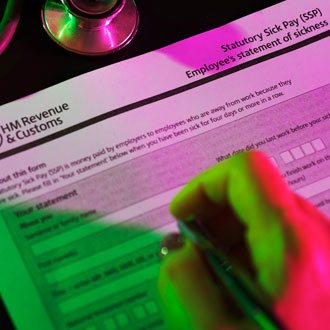The number of fit notes issued has increased by almost 9% in the past two years, according to the latest statistics by NHS Digital.
GPs in England wrote almost 9.5 million fit notes in 2018/19, compared to over 8.7 million in 2016/17 – an increase of 8.6%.
Between 2016 and 2017, there was also a rise in the number of fit notes issued from 8.7m to 9.2m – up 6.4%.
The BMA said the Department of Work and Pensions should consider extending the period of sick leave from 7 to 14 days to help reduce the number of fit notes GPs have to issue, easing an already ‘overstretched’ GP service.
BMA GP committee chair Dr Richard Vautrey said: ‘It is a significant workload for GPs who are the main providers of fit notes. Many areas have tried to encourage secondary care services to issue fit notes after hospital procedures and other contacts but this is still not done consistently enough, which inconveniences patients as well as leading to unnecessary consultations in general practice.
‘We have previously called for an extension of the period of self-certification from 7 days to 14 days, which could empower patients and help reduce unnecessary requests. This is still something DWP should consider as a way to improve access to overstretched GP services.’
Additionally, the statistics show the number of fit notes issued varied with each region across England.
NHS Birmingham and Solihull CCG handed out the largest number of fit notes in March, at a total of 19,712, with GPs in NHS Devon CCG writing 17,309 fit notes in total.
Birmingham and Solihull CCG chief medical officer Dr Richard Mendelsohn said: ‘As the largest single CCG in England, we have a large and diverse population. GPs in Birmingham and Solihull issue fit notes using their clinical judgement, based on the individual needs of the patient.
‘The CCG will continue to support people with getting back to full health. This includes initiatives such as Thrive Into Work, a trial employment support service for people with a mental and/or physical health condition.’
The North East and Yorkshire commissioning region had the highest regional average rate per 100,000 patient population. On average, the region as a whole issued 2,789 fit notes per 100,000 patients in 2018/19, but a total of over 2.25 million fit notes over the course of 2018/19.
GPs working under NHS Halton CCG issued on average the most fit notes per 100,000 in England, issuing an average of 3,939 fit notes per 100,000 in the first quarter of this year, 319 more than 2018.
On the other hand, NHS Central London (Westminster) CCG handed out the fewest fit notes, an average of 884 notes in 2019.
GPs also issued fit notes for longer periods of time. Over 3 million (33.8%) fit notes were for five weeks or longer in 2018/19.
This comes as the DWP recently revised their benefits letter for a second time, which is automatically sent to GPs whose patients fail their capability assessment and are deemed fit to work.
In March, the DWP first made changes to the ESA65B letter that explicitly told GPs not to issue fit notes to patients, even if they were appealing the DWP’s decision saying that they were fit for work.
Some said that this was misleading as patients who appeal the decision still require a fit note to be able to continue receiving benefits.
Pulse July survey
Take our July 2025 survey to potentially win £1.000 worth of tokens





 Oviva’s fully remote Tier 3 Weight Management programme
Oviva’s fully remote Tier 3 Weight Management programme






